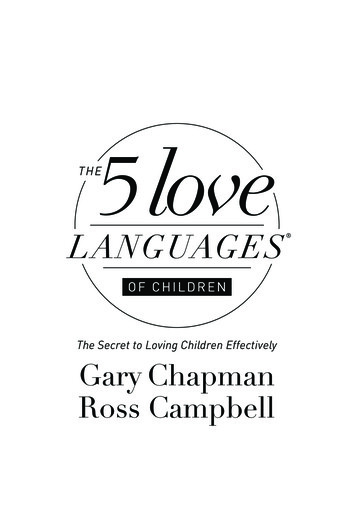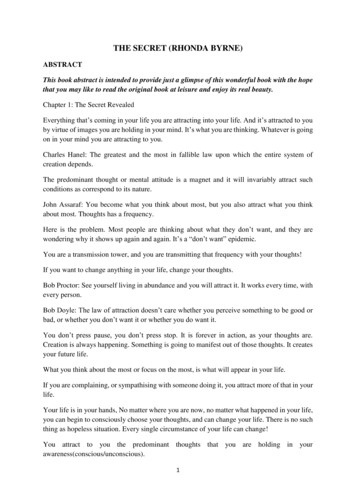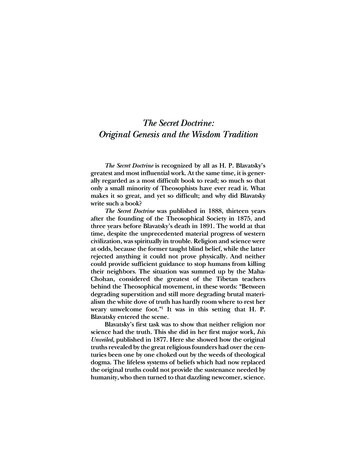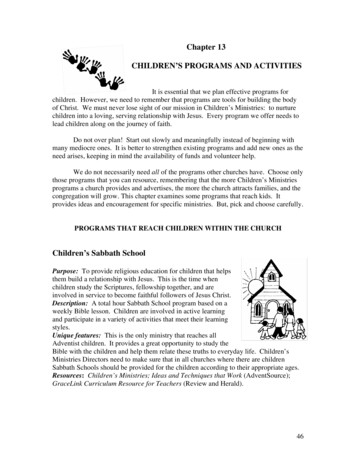
Transcription
OF CHILDRENThe Secret to Loving Children EffectivelyGary ChapmanRoss Campbell
IF YOUR CHILD’S LOVE LANGUAGE ISPHYSICAL TOUCH:Here are a few more ideas especially for parents. Pick and chooseamong them to try something new you think your child willappreciate. When you greet or say goodbye to your young child, gatherthem into your arms and hold them. Kneel down for smallchildren. Let your child hold or cuddle a soft item, such as a blanketto soothe them. Hug and kiss your child every day when they leave andreturn from school, as well as when you tuck them in atnight for younger children. Stroke your child’s hair or rub their back when they tell youabout a difficult day or are upset. Shortly after disciplining your child, take a moment to givethem a hug to show them the discipline was based on theconsequences of their wrongful choices but that you stilllove and cherish them as your child. Snuggle closely together on the couch when watching television together. Give each other a high five or similar congratulations whenever you catch your child doing something positive. Purchase a gift for your child that is touch-oriented, such asa soft pillow, blanket, or sweater. Occasionally yell out a “group hug” for your entire family,regardless of how small or large the family size. To addmore fun, include family pets such as the dog or cat.
Play games or sports together that require physical touch.This will allow both shared time together and touch that ismeaningful without appearing forced. Sing action songs together with your children that requiretouching and action, such as clapping hands, spinning, orjumping. Many of today’s children’s DVDs make this eveneasier. Have “tickle fights” with your children, being careful not toallow it to become a stressful activity for your child. With younger children, read stories together with your childon your lap. When your child is sick or gets hurt, spend extra time providing comfort, like wiping her face with a cool cloth. Hold hands during family prayers.
IF YOUR CHILD’S LOVE LANGUAGE ISW O R D S O F A F F I R M AT I O N :Here are a few more ideas especially for parents. Pick and chooseamong them to try something new you think your child willappreciate. Put a Post-it note in their lunchbox with some encouragingwords. Make a habit of mentioning something specific you’veobserved that highlights your child’s accomplishments.Examples include: “I really appreciated how you showedkindness to that other child,” or “I liked the positive attitudeyou had during the game.” Ask what your child wants to do or be when they grow up.Then encourage them in ways that help them pursue thesedreams. If your daughter says, “I want to be a veterinarianwhen I grow up,” say things like, “I think you’d be a good vet.” Send your older child a text message telling them howmuch they mean to you. Even better, make this a habit forwhen you have to go out of town or on a special holiday suchas a birthday. If you are artistic, create a painting or drawing that showshow much you love your child. Take a picture or other creation your child has made andframe it with a note of why it means so much to you. Call your child at home whenever you think of them just tosay, “I love you.” Create a special name of affection for your child that is onlyused between the two of you.
When you have to be out of town for work or other reasons,leave a series of short notes for your child, one for each dayyou are apart. Make it a habit to say, “I love you” whenever you tuck in yourchild or leave one another. Place their artwork in areas they recognize as importantto you such as the refrigerator, the office, or specialscrapbook. When your child is feeling down, share five reasons why youare proud of them. Leave a note on a cereal box, bathroom mirror, or otherplace you know your child will look. A simple “Daddy lovesyou,” or “Mommy loves you,” in a unique location can bevery powerful. Get a picture key chain and put photos of your children init. Talk about the photos with family or friends when yourchildren are present. Create an encouragement jar that you and your child canuse to drop in notes of praise and read together on aregular basis. Draw a large picture or words of encouragement usingsidewalk chalk on your driveway, either together or as asurprise for them to see later. When a child makes a mistake trying to do somethinghelpful, first use words to recognize that you knew of theirgood intentions.
IF YOUR CHILD’S LOVE LANGUAGE ISQUALITY TIME:Here are a few more ideas especially for parents. Pick and chooseamong them to try something new you think your child willappreciate. Instead of waiting until all your chores are done beforespending time with your child, include them in your dailyactivities such as laundry, grocery shopping, or yard work.Though it may take longer, the time together will make upfor the inconvenience. Stop what you are doing to make eye contact with your childas they tell you something important. Fix a healthy snack together, such as a plate of cut-up fruit. Find silly things to laugh about and laugh a lot about them. Give older children single-use cameras to record meaningfuloccasions. Turn off your television show to watch your child’s favoriteshow with them. Go to the toy store and play with some fun toys with nointention of buying anything. Ask very specific questions about your child’s day that donot have a yes or no answer. When taking your younger children to a park or playground,spend the time actually playing with them instead ofwatching from the park bench. Pushing your daughter onthe swing or riding the slide with your son creates lifelongmemories and communicates love.
Instead of screen time, focus on arts such as singingtogether or finger painting. Schedule a specific “date time” with each of your childrenindividually. Put it in your calendar and don’t allow otherpriorities to take its place. Surprise your child with tickets or a trip to a special place.A camping trip, big-league baseball game, or day in the citycan build lifelong memories. Add pictures of the event tofurther strengthen this surprise. If possible, take your child to your workplace one day.Introduce your child to your coworkers and take your childto lunch with you. Set aside a special place in the house where you go to play.A walk-in closet can serve as a “castle,” while a place in thegarage can serve as your “workshop.” Involve older children in vacation planning, researching theInternet together. Have a campout together, even if it is simply a tent in youryard. Include flashlights and special camp foods to makethe event complete. Occasionally take family walks or bike rides together. Seekopportunities to spend time together that also includeexercise. Share more meals together as a family. Make dinnertimea special occasion with lots of talk about the day. Familyprayer can also strengthen this time. Spend a few extra minutes putting your child to bed at night.Bedtime stories, talking about the day, or praying togetherat night can each be part of your everyday pattern.
For older children, spend time doing “homework” together—they with their schoolwork and you with any work projects.Tell them what you’re working on. Plant something together. For those with outdoor-orientedchildren, time together in a flower garden, planting summer vegetables, or landscaping the yard can create lifelongpositive memories. Make photo albums together on your computer. Talktogether about the memories you shared in the process. On a rainy day, sit in the same room and read quietly, eachof you with your own book or magazine.
IF YOUR CHILD’S LOVE LANGUAGE ISGIFTS:Here are a few more ideas especially for parents. Pick and chooseamong them to try something new you think your child willappreciate. Keep a small collection of inexpensive gifts packed away foryour child. Then give them one at a time as you sense thereis a need. Select presents that fit the interests of your child. Carry snacks or small candies you can give out as a “treat”when away from home. Make a meal you know your child likes, go to a specialrestaurant, or make their favorite dessert. Start a collection of unique gift boxes and wrapping papersthat can be used to package even the most simple ofpresents. When away from home, mail a small package to your childwith their name on it. Give personally made coupons for your child, good forsome of their favorites, such as a free spaghetti dinner, anextra-half hour of time with you before bedtime, or a smallgift next time you are shopping together. Keep a “gift bag” of small, inexpensive gifts your child canchoose from as a reward for doing something positive. Make after-school snacks memorable by serving them ona special plate or making a “face” out of grapes and babycarrots. Be on the lookout for personalized gifts with your child’sname on them. Save them for a rainy or difficult day as anencouraging surprise.
Give your child a “song,” either one you make up or a specialsong you select that reminds you of them. Create a treasure hunt for a gift that includes a map andclues along the way to the main surprise. Hide a small gift in your child’s lunchbox. If you are away from your child a few days, leave a smallpackage for each day with a special gift and note remindinghow much you love them. Instead of spending money on a larger gift for a birthday,host a birthday party at a special event location. Consider a gift that lasts, such as a tree you can planttogether or a computer game you can play together in thefuture. Buy or make your child a special ring or necklace to wearthat is just from you. For young children, find “nature gifts” such as wildflowersor interesting stones wrapped in a special paper or box. For a birthday or Christmas, shop with your child for aspecial gift—asking her opinion. This personal involvementwill make the gift more meaningful. Keep a chart and some fun stickers to keep a record ofaccomplishments. Reward your child with a gift after a setnumber of stickers are earned. Create a “secret drawer” where your child can keep hersmall “treasures”—anything from a bird feather to a pack ofgum.
IF YOUR CHILD’S LOVE LANGUAGE ISACTS OF SERVICE:Here are a few more ideas especially for parents. Pick and chooseamong them to try something new you think your child willappreciate. Help your child practice for their sports team, such as pitchand catch for baseball or shooting free throws for childrenparticipating in basketball. Sit down and help your child if they’re having computerproblems. Instead of just telling your younger children to go to bed,pick them up and gently carry them and tuck them in theirblankets. For school-age children, help them select their outfit forthe day as they are waking up in the morning. Occasionally wake up a half-hour earlier to make a specialsurprise breakfast for your children. Begin teaching your child the importance of serving othersthrough regular involvement together in a local communitygroup or church ministry. For younger children, set up your child’s favorite toys whilethey are taking a nap or are at school so they can immediatelyplay with them (with you!). When running late to an appointment or meeting, help yourchild quickly finish what they are doing so you can both beready faster instead of just telling them to hurry. During a time when your child is sick, go the extra step bysetting up their favorite movie, reading them stories, orbuying them a book in one of their favorite series.
Connect your child with one of your friends or familymembers who can help them in an area of interest such ascomputer technology, soccer, piano playing, or scouting. Choose one area in which you determine to alwaysserve your child above and beyond normal expectations.Examples could include making sure there are alwaysmarshmallows in your child’s hot chocolate, making suretheir favorite teddy bear is in their bed at bedtime, or havingall of the paint supplies ready when they are ready to paint. Start a “birthday dinner” tradition where you make yourchild any meal they want on their birthday. Make a list of several of your child’s favorite things they dowith you. Then periodically do one of their favorites whenthey least expect it. Create flash cards for your child’s upcoming test or quiz.Work together with your child until they feel confident withthe material. Assist your child in fixing a favorite broken toy or bicycle.Simply taking the time to repair it communicates love to achild whose love language is acts of service.
THE ANGER LADDERpositive1. LEASANT SEEKING RESOLUTION FOCUSING ANGER ON SOURCEP HOLDING TO PRIMARY COMPLAINT THINKING LOGICALLY2. PLEASANT FOCUSING ANGER ON SOURCE HOLDING TO PRIMARY COMPLAINT THINKING LOGICALLYpositive and negative3. FOCUSING ANGER ON SOURCE HOLDING TO PRIMARY COMPLAINT THINKING LOGICALLY Unpleasant, loud4. HOLDING TO PRIMARY COMPLAINT THINKING LOGICALLY Unpleasant, loud Displacing anger to other sources5. FOCUSING ANGER ON SOURCE HOLDING TO PRIMARY COMPLAINT THINKING LOGICALLY Unpleasant, loud Verbal abuse6. HINKING LOGICALLY Unpleasant, loudT Displacing anger to other sources Expressing unrelated complaintsp r i m a r i ly n e g at i v e7. Unpleasant, loud Displacing anger to other sources Expressing unrelated complaints Emotionally destructive behavior8. Unpleasant, loud Displacing anger to other sources Expressing unrelated complaints Verbal abuse Emotionally destructive behavior9. Unpleasant, loud Cursing Displacing anger to other sources Expressing unrelated complaints Verbal abuse Emotionally destructive behavior10. F OCUSING ANGER ON SOURCE Unpleasant, loud Cursing Displacing anger to other sources Throwing objects Emotionally destructive behavior11. Unpleasant, loud Cursing Displacing anger to other sources Throwing objects Emotionally destructive behaviornegative12. F OCUSING ANGER ON SOURCE Unpleasant, loud Cursing Destroying property Verbal abuse Emotionally destructive behavior13. Unpleasant, loud Cursing Displacing anger to other sources Destroying property Verbal abuse Emotionally destructive behavior14. Unpleasant, loud Cursing Displacing anger to other sources Destroying property Verbal abuse Physical abuse Emotionally destructive behavior15. Passive-aggressive behavior ote: Phrases in capital letters indicate positive ways to express anger feelings.NSource: Ross Campbell, How to Really Love Your Angry Child (Colorado Springs:Cook, 2003).
More Helps for ParentsRoss Campbell, How to Really Love Your Child. Colorado Springs: Cook,2004.Ross Campbell, How to Really Love Your Angry Child. Colorado Springs:Cook, 2003.Les Carter and Frank Minirth, The Anger Workbook. New York: Wiley & Sons,2004.Gary Chapman, The 5 Love Languages. Chicago: Northfield, 2015.Gary Chapman, The Family You’ve Always Wanted. Chicago: Northfield, 2008.Foster W. Cline and Jim Fay, Parenting with Love and Logic. Colorado Springs:NavPress, 2006.Mary DeMuth, You Can Raise Courageous and Confident Kids. Eugene, Oreg.:Harvest House, 2011.focusonthefamily.com: This website is packed with helpful resourceson a wide variety of family-oriented topics.John Fuller, First-Time Dad. Chicago: Moody, 2011.
216 THE 5 LOVE LANGUAGES OF CHILDRENWillard F. Harley, Mom’s Needs, Dad’s Needs: Keeping Romance Alive Even afterthe Kids Arrive. Grand Rapids: Revell, 2003.Tim Kimmel, Grace-Based Parenting. Nashville: Thomas Nelson, 2005.Kathy Koch, PhD, 8 Great Smarts: Discover and Nurture Your Child’sIntelligences. Chicago: Moody, 2016.Kevin Leman, Have a New Kid by Friday. Grand Rapids: Revell, 2008.Kevin Leman, Single Parenting That Works. Grand Rapids: Revell, 2006.James R. Lucas, 1001 Ways to Connect with Your Kids. Wheaton, Ill.: Tyndale,2000.Arlene Pellicane, Growing Up Social: Raising Relational Kids in a Screen-DrivenWorld. Chicago: Moody, 2014.John Rosemond, Parenting by the Book. New York: Howard, 2007.Jill Savage and Kathy Koch, PhD, No More Perfect Kids: Love Your Kids for WhoThey Are. Chicago: Moody, 2014.Tedd Tripp, Shepherding a Child’s Heart. Wapwallopen, Pa.: Shepherd Press,1995.H. Norman Wright, Helping Your Kids Deal with Anger, Fear, and Sadness.Eugene, Oreg.: Harvest, 2005.
For Parents and Kids:THE LOVE LANGUAGES MYSTERY GAMEFOR PARENTS OF CHILDREN 5 TO 8 YEARS OLD:So many parents wonder about their child’s love language, andadmittedly, determining the love language of a young child requiressome educated guesswork. Why? Because young children can’t yetverbalize their love language. However, for children ages 5 to 8 yearsold, you might try the following exercise. Ask him or her to draw orcall out some ways parents love their children. You should try notto guide their drawings or answers, limit their responses, or requiremore responses than what he or she is prepared to give at the timeyou ask. Depending on the child’s attention span and the time of day,you may get many answers, or you may get very few. If it seems likeslow going, then you may want to secretly explore the subject of lovewith your child for a week or so until you can deduce what he or sheperceives as love.You may find yourself reading books or watching TV or a moviewith your child and asking the question, “How do you know thatmommy or daddy loves that little boy or little girl?” Or you mayintentionally experiment by expressing love in each of the five waysover a week’s period of time. This will be a subjective measure, but thecombination of all these suggestions—studying your child’s answersor drawings, listening to his or her answers about other parents andchildren, and “measuring” his or her response to your expressionof each of the five love languages—should be enough to help you
218 THE 5 LOVE LANGUAGES OF CHILDRENaccurately assess your child’s primary love language. If you are luckyenough to catch your child in a talkative or expressive mood, you maybe able to get him or her to identify several ways parents show love.You’ll be looking for a theme or a repetition in their answers, andfrom this, you can accurately determine your child’s love language.FOR PARENTS OF CHILDREN 9 TO 12:By the time a child is 9 years old, he or she is better able to identifyand express his or her feelings about love than when he or she wasyounger. Parents still have to keep in mind that children this age havea limited attention for and limited interest in such things as helpingyou determine their love language. The following “game” should helpyou in your research.Tell your child you would like help solving “The Love LanguageMystery Game.” Explain that you need him or her to look at a listof “clues” and that these clues are comments that parents sometimesmake to their children. Your child will see a set of 20 clue boxes, eachwith two comments. He or she must pick one of the two commentsin each clue box based on which comment they like better. Explainthat at the end of all the clues, you and your child can count the clueshe or she circled and solve the mystery. If your child asks what the“mystery” is or what it is about, you can simply explain that it’s a gamein which parents are trying to learn what makes kids happy or whatthey like to hear their parents say.To give this a game-like effect, you should secretly write on a pieceof paper what you think your child’s love language is (words, touch,time, service, gifts). That is, which letter will he or she most oftencircle? Do not let your child see your guess but tell him or her thatyou have written down your guess and will find out at the end of the
Th e L ove L a n g u a g e s Mys t e r y G a m e 219game if you guessed right. After your child has gone through the setof clues, help him or her count and transfer the answers to the appropriate blanks. Reveal your guess and tell your child if you guessedcorrectly. For your knowledge, A Physical Touch, B Words ofAffirmation, C Gifts, D Acts of Service, and E Quality Time.This activity will have been little more than a game to your childto see if he or she got the same answer to the “mystery” that you got.He or she will have little clue that you’re using this information tofurther confirm or clarify your guess about his or her love language.Because children expect games to end in a “reward,” tell your child atthe end of the “mystery solving” that, whether or not you guys endedup with the same answer, you’ll celebrate by doing something funtogether (i.e., eating a favorite snack, watching a movie, playing agame of your child’s choosing, etc.).Some children will help “solve the mystery” and be satisfied notasking any questions. If your child happens to inquire about this socalled mystery you wanted help with, give a brief explanation of thelove languages and tell your child that you just want to make sure heor she recognizes and receives your love. Depending on your child’smaturity level, he or she may be able to share his or her thoughts onthe matter and further clarify his or her love language.You are now ready to introduce your child to “The Love LanguageMystery Game.” At the top of the “game” or profile, you’ll see a briefset of instructions that explain to your child how to take and scorethe profile. Because of your child’s age and potential questions heor she may have, be prepared to read the instructions to him or herand answer any questions he or she may have. Also be prepared tohelp your child score the profile by helping him or her count thenumber of times he or she circled each letter (A, B, C, D, E). Finally,
220 THE 5 LOVE LANGUAGES OF CHILDRENif your child needs help transferring his or her scores to the appropriate blanks at the end of the profile, then offer to assist with that aswell. Have fun, and enjoy unlocking the mystery of your child’s lovelanguage!THE LOVE LANGUAGES MYSTERY GAMEEach clue box has two comments that parents sometimes make totheir children. Read each clue box and, of the two comments, pickthe one you like better and wish your mom or dad would say to you.Then circle the letter that goes with that comment. Be careful andonly circle one letter in each clue box! After you’ve gone through all20 clue boxes, go back and count how many A’s, B’s, C’s, D’s, and E’sthat you circled. Then write your scores in the blanks at the end of thegame. Ask your mom or dad for help if you have any questions. Andhave fun unlocking the love language mystery!123456Give me a hug!AYou are terrific!BI’ve got a special birthday present for you!CI’ll help you with your project.DLet’s go to a movie.EGive me a high five!AYou are so smart!BHave you made your Christmas list?CWould you help me cook dinner?DI like going to fun places with you!EGive me a kiss!AYou are #1!B
Th e L ove L a n g u a g e s Mys t e r y G a m e 221789101112131415161718I’ve got a surprise for you.CWe can make something really cool.DLet’s watch TV together!ETag, you’re it!AYou did a great job!BYou’ve earned a special surprise!CYou can invite your friends.DLet’s go to your favorite restaurant.EI’m going to give you a big hug!AYou are an awesome kid!BI made your favorite food.CI checked your homework, and it looks great!DYou are fun to hang out with!EI’ll race you!AWow! You did it!BCheck under your bed for a special present!CI cleaned up your room for you.DLet’s play a game together.EWould you like for me to scratch your back?AYou can do it! Don’t give up!BWhat would you like for your birthday?CWe can pick up your friend on the way to the movie.DI always like doing stuff with you.EYou are so huggable!A
2221920 THE 5 LOVE LANGUAGES OF CHILDRENHow did you know how to do that? You are brilliant!BI can’t wait to give you your present!CDon’t worry! I’ll pick you up on time!DLet’s spend the day doing whatever you want to do!EHow many A’s did you circle? A’s stand for physical touch. People whose love language isphysical touch like to receive hugs, kisses, and high fives.How many B’s did you circle? B’s stand for words of affirmation. People whose love language is words of affirmation like for others to use words totell them that they are special and that they do a good job.How many C’s did you circle? C’s stand for gifts. People with the love language of giftsfeel good when someone gives them a special present orsurprise.How many D’s did you circle? D’s stand for acts of service. A person whose love languageis acts of service likes it when others do nice things for themsuch as helping with chores, helping with school projects,or driving them places.How many E’s did you circle? E’s stand for quality time. People with the love language ofquality time like it when others do things with them likewatch a movie, go out to eat, or play a game.
Th e L ove L a n g u a g e s Mys t e r y G a m e 223Now ask your mom or dad what letter he or she guessed youwould circle the most? Write the letter he or she guessed in this blank.Did your mom or dad guess the same letter that you chose most oftenwhen playing the love language mystery game? Circle: Yes or NoCONGRATULATIONS! You’ve solved the love language mystery and figured out what your love language is! Good job!
Gary Chapman Ross Campbell The Secret to Loving Children Effectively. IF YOUR CHILD’S LOVE LANGUAGE IS PHYSICAL TOUCH: Here are a few more ideas especially for parents. Pick and choose among them t










